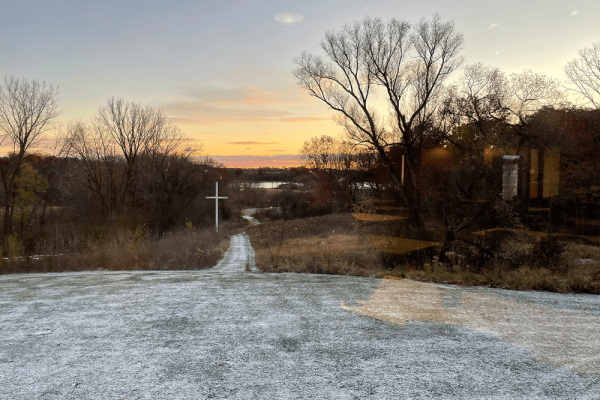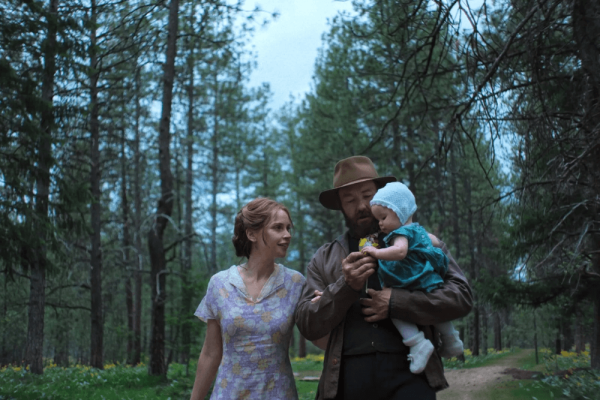THE NATURE OF dishonor and consequence are what these passages teach. For the average Bible reader, the front matter of the book of Hosea—specifically the first three chapters—disturbs the conscience. At the time of Hosea’s calling, God’s first words are: “Go, take for yourself a wife of whoredom and have children of whoredom, for the land commits great whoredom by forsaking the Lord” (1:2). Wow!
The writer of Hebrews proposes an alternate reality: Any reality worth seeing comes into view through faith in the unseen (see Hebrews 11:1). Prophet Isaiah sees what God sees through another portrait. Like believers today, empty rituals and defiled worship strain Isaiah’s eyes. Do we have eyes to see what the prophet saw in our context of racial intolerance and religious bigotry? Harsh judgment meted out in scripture is generally in response to an act of rebellion or for defaulting on a covenantal agreement. An aggrieved God enters our contemporary global vineyard asking Christians today, “What more was there to do for my vineyard that I have not done in it? When I expected grapes, why did it yield wild grapes?” (see Isaiah 5:1-4).
The essential work of the guardian is to protect the investments. While we are not permitted to “psychologize” the prophet Jeremiah, we can still say that shame is evident. To say, “Why me, God?” rather than “Why not me?” is to be imprisoned by a faulty internal transcript.
August 4
Sin-Stained Garments
Hosea 11:1-11; Psalm 107:1-9, 43; Colossians 3:1-11; Luke 12:13-21
WHEN PERFECTLY LANDED on the ear of one nabbed for some error of judgment or misdeed, the reprimand “shame on you” is intended to trigger remorse in the perceived offender. Shame works on the psyche in ways distinguishable from guilt. Guilt addresses human behavioral defects. Shame, on the other hand, means living in the prison of a marred internal transcript. Guilt leads one to say, “Forgive me, I was wrong to hurt or offend you.” By contrast, shame says self-referentially, “I am wrong, irredeemably so, and will never be good enough.”
There is no buildup in the first chapter of Hosea. God goes straight for the jugular to shame a disloyal covenant partner. The prophet Hosea and wife Gomer are called to the stage to act things out. Husband Hosea is metaphorically cast as the deity; wife Gomer, as the promiscuous Israel. One must take great care when handling theologically problematic texts such as these that use imagery that casts a male as God and a female as sinful and unchaste: Such texts have been misused to justify violence against women.
Hosea 11 presents a contrasting picture to this objectionable imagery. We find God cast as parent and Israel as the wayward one. “When Israel was a child, I loved him ... it was I who taught Ephraim to walk, I took them up in my arms ... I bent down to them and fed them.” And yet, “the more I called them, the more they went from me” (see 11:1-4). God reaches toward Israel and Ephraim in tenderness and the household of faith turns away.
In the next scene, an ashamed God enters bearing mercy and compassion to share. “How can I give you up, Ephraim? How can I hand you over, O Israel?” (verse 8). The northern kingdom becomes an Assyrian vassal but eludes annihilation with six words of divine justification: “I am God and no mortal” (verse 9). This same God remains steadfast in desert-like conditions, satisfies hungry and wearied souls, orchestrates mighty acts of deliverance (Psalm 107), and demands good ethics, such as “putting on salvation” and shedding sin-stained garments for new ones as a sign of our baptism (Colossians 3).
August 11
New Social Order
Isaiah 1:1, 10-20; Psalm 50:1-8, 22-23; Hebrews 11:1-3, 8-16; Luke 12:32-40
THE LETTER TO THE Hebrews is a sermon by an anonymous Christian to a largely Gentile Jewish audience in the aftermath of the First Jewish-Roman War. This community now found their towns decimated, their land seized by Roman forces, and the temple in Jerusalem destroyed. Pressured to reclaim a sense of religious identity, the sermon encourages those whose faith was traumatized to not shrink back from proclaiming Christ.
Chapter 11 urges the displaced and dismayed converts to remember the lives of faithful forebears who trusted God and practiced faith without the temple. Such trust inspires doxology because what was divinely spoken to the ancestors by the prophets remains continuous in the proclamation of the promised heir, Christ. This Jesus arrives in the narrative rightly positioned in the Abrahamic procession of persons “who by faith” searched for a homeland of permeable borders, a heavenly city not walled by human means. The preacher of Hebrews reminds that such trust will be rewarded by access to a God not ashamed to be called their God (verse 16).
The prophet Isaiah does not see a bruised or broken people. His vision is occupied by the wickedness of his kinsfolk. The Lord says, “What to me is the multitude of your sacrifices? I have had enough of burnt offerings. … When you stretch out your hands, I will hide my eyes from you; even though you make many prayers, I will not listen to you” (Isaiah 1:11, 15).
Whether we’re watching energy regulations abandoned to allow more drilling offshore, or real estate encroachment of lands set aside for descendants of war-decimated persons indigenous to these shores, or passively looking on as politically conservative policy wonks drive legislation to gut health-care benefits and food programs for the economically vulnerable, Jesus asks of us the hard thing.
In Luke 12, Jesus gives a command: “Sell your possessions and give alms” (verse 33). The wisdom of Jesus’ words to his disciples regarding parting with the social trappings of wealth gives rise to trusting the voice speaking from the text, “Do not be afraid, little flock,” for God wants to give you a new social order (verse 32), an incorruptible treasure.
August 18
Growth of Evil
Isaiah 5:1-7; Psalm 80:1-2, 8-19; Hebrews 11:29 - 12:2; Luke 12:49-56
IN HIS SERMON “Automatic Earth,” theologian Howard Thurman insists that when barriers to growth are removed and conditions are right, then the yield from seeds planted in soil is assured. But to the people of Judah, Isaiah sings a different ditty. “My beloved had a vineyard on a very fertile hill … dug it and cleared it of stones, and planted it with choice vines; [then] built a watchtower in the midst of it … [and] expected it to yield grapes, but it yielded wild grapes” (Isaiah 5: 1-2). In other words, God planted and expected justice, but instead saw bloodshed of the oppressed. To make the point crystal clear, the prophet repeats the second verse lyrics in verse 4.
Psalm 80 marshals similar imagery. The shepherd of Israel leads the flock of the people out of Egypt and clears the ground for planting them in fertile soil (verses 1-2, 8-12). Yet an unrepentant people forsake care of God’s vineyard. Neglect is the antithesis of responsible guardianship. Irresponsible stewards forsake salvation and receive hard judgment. Therefore, guardians must be alert to matters that threaten the planter’s purposes.
Jesus reminds the crowds that his coming was to bring judgment, not tranquility. If they dwell on what’s here today and gone tomorrow and remain spiritually clueless, then they know nothing about divine ecology, nothing about understanding God’s life-giving purposes (Luke 12). To haphazard meteorologists, Jesus says: “When you see a cloud rising in the west, you immediately say, ‘It is going to rain’; and so, it happens. And when you see the south wind blowing, you say, ‘There will be scorching heat,’ and it happens. You hypocrites!”
This throat-clearing rebuke heard by the crowd beckons Christians to confront a truth many do not intend to accept as fact: that we live in a world that supports growth, even the growth of evil and suffering born of myriad forms of spiritual hypocrisy. And if you think Jesus came to bring peace in the face of hypocrisy, Jesus says, “No, I tell you, I do justice by division.”
August 25
An Inherent Dignity
Jeremiah 1:4-10; Psalm 71:1-6; Hebrews 12:18-29; Luke 13:10-17
CAN YOU IMAGINE God saying to you in childhood, as to Jeremiah, “you will overthrow kingdoms, uproot evil, and tear down walls” (1:10)? That sounds intimidating, right? Appointed during King Josiah’s reign, this 7th-century prophet receives God’s commission to be a herald. Babylon has emerged as a new threat to Judah. The northern kingdom has been captured following the destruction of the temple. Mass deportations of artisans, sentinels, and aristocrats are underway. And to boot, flanking Judah’s southern border is the old nemesis, Egypt.
Jeremiah emerges from the womb into this charged political environment to receive his ordination papers. No one wants the work of convincing unrepentant monarchs that their tightly held belief in divine protection might be revocable. At least for Jeremiah, God says reassuringly, “Do not be afraid of them, for I am with you to deliver you” (1:8). The work to which Jeremiah is called is scandalous. The prophet will have to face the daily reminders that the social environment in which he was formed is religiously and politically poisoned.
At the heart of Jeremiah’s vocation is the work of helping his kinspeople to critically examine the merits of their deeply embedded faith claims. The work of dislodging deeply embedded beliefs about racial and ethnic superiority, for example, in a society that has enthroned whiteness is far more formidable a challenge than nurturing a baby from speechlessness to adulthood to see the inherent dignity and worth of all people. How can we be saved from the sham of shame?
Jesus had no problem breaking shameful custom to heal a woman who had endured a debilitating condition for 18 years. Not unlike the spiritual fistfights into which Jeremiah would later be called, Jesus meets the religious gatekeepers who exalt protection of tradition over human life with shaming words: “You hypocrites!” Let us not earn the same label.

Got something to say about what you're reading? We value your feedback!







